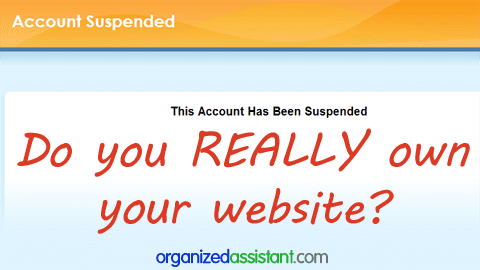Do you REALLY own your website?
This page may contain links to Amazon.com or other sites from which I may receive commission on purchases you make after clicking on such links. Read my full Disclosure Policy

So you’ve launched your own website – congratulations! If you’re like most professional organizers and other entrepreneurs, seeing your business name up there on the Internet is so exciting – it really makes you feel like you’ve hit the big time. But wait – does that website actually belong to you, in every sense of the word? Read on to find out.
Website Builders & Closed Source Content Management Systems
Many web hosting packages include free site building software that make it easy for you to create your own site, without the need for technical training. It may seem like a good deal, but if you ever decide to move your site to another web host, or convert it to WordPress or another platform, you’ll have to start over from scratch, as there’s no way to export the content. In other words, THEY control your website, not you.
I once had a client who used this type of system. In order to expand her site beyond the few pages included in her package, she had to pay so much that she could have had a custom site designed. She once took her site down for a short time while she took a break from her business, and when she was ready to start up again, guess what? She had to rebuild the site from scratch.
Another client used an expensive Content Management System developed by her web design firm, and she faced similar challenges: no way for her to export the content, and the only way for her to make major changes to the site was to pay a hefty fee. We ultimately converted the site to WordPress by copying and pasting her content, page by page.
WordPress
If you’re a regular reader, you know I’m a huge fan of WordPress. But if you go with WordPress.com rather than installing WordPress on your own hosting account, make sure you read and adhere to their Terms of Service. If you break any one of their rules, your site may be taken down without prior warning, and once it’s gone, not only have you lost your content, but the site name you were using becomes unavailable.
It’s important to note that WordPress.com (and other “free” hosting services) are financed by placing ads on your site, over which you have no control. With self-hosted WordPress, you get to choose whether or not you want ads, which ads to display and where they appear, and the advertising revenue goes to you, not your web host.
Let’s say you’ve taken my advice and had a WordPress site created for you by a web developer. Excellent! But what user role have they given you? If it’s less than Administrator, you won’t be able to keep your plugins and WordPress installation updated, change to a new theme, or perform other maintenance functions. That’s okay if you’ve arranged for your web person to handle them for you on an ongoing basis, but if you plan to sever ties once your site is launched, make sure they give you Admin access.
Why is this important?
What if something happened to the person who has control of your site – illness, accident, death? Or if they went out of business, and you were unable to contact them?
What if you wanted to change something and the person refused to give you control?
Domain Name and Hosting
As I explained in my Website Owner’s Guide for Non-Techies, domain registration and web hosting are two separate things, but for the purposes of this article, I’ll cover them together, as they are often purchased from the same service provider.
It’s important that these services be in your name and that you have access to the account(s), even if you leave it up to your website designer to set everything up for you. Ultimately, it’s up to you to ensure that your services are renewed prior to the due date to make sure your site doesn’t go down.
If you’re not sure whether the domain is registered to you or someone else, go to who.is and enter your domain name. In most cases, you’ll be able to view the necessary information.
When registering a domain on behalf of a client, I always put it in their name unless they insist otherwise. Similarly, each client has his or her own hosting account, whether they’ve purchased it directly from a web hosting company or through my hosting service.
Why is this important?
What if they don’t renew your domain name for whatever reason? Once your domain name expires, your website will go down, and you may have to pay an extra fee to get it back up and running again. Even worse, someone else might buy your domain name. You’d then be forced to choose a different one, causing you to lose traffic, not to mention all the backlinks you’ve worked hard to gain. The person who buys your domain name might try to sell it back to you for a ridiculously high amount or, perhaps even worse, misrepresent you and your business.
In addition, you may run into a situation where the individual who controls your domain name and/or hosting is not available due to illness, death, or going out of business, as described under “WordPress” above.
If you find yourself in one of these situations, you may have to follow these steps:
- Talk to your web person, if possible. Some may give you a hard time because they don’t want you taking your business elsewhere, but most people are reasonable. If they refuse to cooperate or you’re unable to reach them, you’ll need to proceed to step 2.
- Contact the domain registrar and/or hosting company for assistance. If you don’t know who it is, check the WHOIS record.
- Check with ICANN to find out what options you have.
- Take legal action if necessary.
Have you ever run into problems because someone else controlled your domain name, your hosting account, or your website itself? How did you resolve it?




In a very similar vein to your post Janet, one of my clients was using cheap hosting provider that went bust.
Their servers were repossessed and so was his website, all the data and uploaded files (including a custom design) were deleted when the servers were formatted.
He had backups but they were held on the same server that was taken by the repo-men.
My recommendation is always make sure you backup your site and keep an offsite copy. Many of the common backup solutions allow you to keep a copy of your site on dropbox or amazon s3, so in the event of an issue with your hosting you can always re-create your site from the offsite backup.
Yikes! What a terrible thing to have to go through! Thank you for sharing this story and reminding my readers about the importance of backups.
I have found that whatever advice you provide, Janet, is it consistently in the best interest of your clients. This blog post is no different. Hmmm, small wonder that even though I have frequently changed service providers throughout my 25 years in business, I have remained a loyal patron of Organized Assistant!
Thanks, Nina! It is always a pleasure working with you!
Janet, thanks for “saving” our website!
We used an expensive web developer who hosted the site and charged for all development. Thanks to Organized Assistant, we converted to a WordPress site. We stay current and relevant by updating our site regularly. Janet’s support has always been timely, top-notch, and cost effective.
Thank you, Sharon!